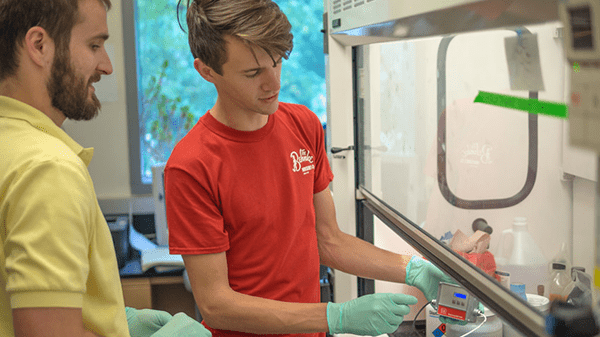Photo: Eric Swanson and David Peeler, Bioengineers Without Borders team members and Bioengineering graduate students.
A group of engineering students, led by BioE Ph.D. students Eric Swanson and David Peeler, are developing an affordable, portable anesthesia delivery device that can make surgeries possible and reduce unnecessary deaths in low-resource settings. The project is among five currently being pursued by Bioengineers without Borders (BWB), a UW student-led organization that develops low-cost, sustainable medical technologies while providing students with engineering design experience and professional development. UW’s College of Engineering recently reported on the team’s efforts in a recent web story.
The type of devices used to deliver general anesthesia used in developed countries like the U.S. are impractical for use in challenging clinical environments, such as the developing world, combat zones and other low-resource settings. These devices, known as plenum vaporizers, are expensive and difficult to transport, and require access to electricity and pressurized oxygen. In resource-poor places, draw-over vaporizers, which don’t require pressurized oxygen and can be easily transported, are used instead. However, they lack the safety features found in plenum vaporizers, such as temperature control components that ensure safe delivery of the anesthesia, and must be operated by trained personnel. Draw-over vaporizers also need electricity to run, making their use in areas without reliable power difficult.
Portable anesthesia delivery devices exist, but their significant cost – thousands of dollars per device – puts them out of reach of poorer regions. The BWB team led by Swanson and Peeler aims to offer their device at a fraction of the cost of other portable machines on the market. Their device is also being designed to control reservoir temperature and deliver a safe anesthetic dose in a variety of environmental conditions, enabling its use by minimally trained technicians.
The team works closely with UW Bioengineering Associate Professor Wendy Thomas and Anthony Roche, a UW Medicine professor of anesthesiology. When the team needed lab space, Dr. Thomas provided them with space in her own lab – and mentorship. Through Dr. Roche, the team has been able to connect with anesthesiologists locally and abroad who can offer feedback on prototype design and fabrication. The team is also working with the Global WACh-Coulter Foundation – a UW center that seeks to improve the well-being of women, children and adolescents – and PATH, a nonprofit organization committed to global health innovation.
In 2015, the team received a $30,000 seed grant from the Global WACh-Coulter Foundation to design a benchtop test circuit, including a prototype of a simplified anesthetic vaporizer. Earlier this year, they received a $15,000 grant from PATH’s Health Innovation Portfolio, which enabled them to expand their work. They are also refining a 3-D computational model of an anesthetic vaporizer that accounts for the physics of convection, heat transfer and drug evaporation and delivery.
Later this year, the team will survey stakeholders and end-users in Uganda to better understand the programmatic and clinical feasibility of an improved vaporizer. They will also investigate commercialization potential of the device, and continue refining their prototype.



